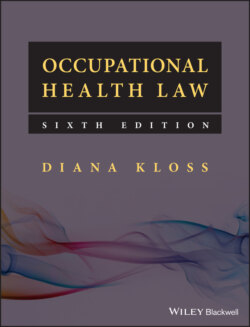Читать книгу Occupational Health Law - Diana Kloss - Страница 63
2.14 Expert witnesses
ОглавлениеWhere OH professionals give an opinion as an expert in legal proceedings they cannot be sued for defamation in respect of anything said in court or in documents produced in preparation for legal proceedings. This is for reasons of public policy. It is important that witnesses feel able to speak freely. But in General Medical Council v. Meadow (2007) the Court of Appeal overturned the ruling of a High Court judge that this immunity exempts doctors from fitness to practise proceedings before a professional body. Health professionals can be held guilty of professional misconduct if they give evidence to a court which is so incompetent and lacking an evidence base as to amount to negligence. Professor Roy Meadow, a paediatrician, was struck off the Medical Register for serious professional misconduct in respect of evidence he gave at the criminal trial of Sally Clark, who was convicted of murdering two of her infant children (though the conviction was later overturned when medical evidence which cast doubt on the prosecution’s case and should have been made available to the defence came to light). Professor Meadow misinterpreted the statistics relating to sudden infant death syndrome.
The appeal court also held by a majority that, although Professor Meadow had rightly been convicted by the GMC of professional misconduct, it was not serious enough to justify the striking from the register and his registration was restored.
Until 2011 the common law rule about the liability for negligence of an expert witness, which had stood for 400 years, was as stated by the House of Lords in Watson v. M’Ewan (1905). It was that expert witnesses were immune from liability for negligence in respect of their evidence in court and also their preliminary opinion given in preparing for trial, including their assessment of the value of the claim. In Jones v. Kaney (2011) the Supreme Court changed the law by a majority of 5:2. A road traffic accident occurred in Liverpool when Jones, who was stationary on his motor cycle, waiting to turn at a junction, was knocked down by a driver who was drunk, uninsured and driving while disqualified. Jones suffered physical injury and claimed that he had also suffered severe psychiatric damage. A claim for compensation was made against the Motor Insurers’ Bureau and liability was admitted. The only issue was how much the claimant should receive in damages. As is common, the judge ordered the two experts employed by both sides to prepare a joint report. The insurers’ expert, a consultant psychiatrist, expressed the view that the claimant was exaggerating his symptoms. The claimant’s expert, a clinical psychologist, Dr Kaney, did not challenge this and signed a joint report stating that Jones was deceptive and deceitful. This was not what she had written at first; she said later that she had been pressured to agree with the psychiatrist but did not in fact agree with him. It was alleged that she signed the joint statement without reading it. Because of this evidence the claimant had to settle his claim for a much lower sum than that to which he thought he was entitled. He sued the psychologist for negligence. Her defence was that she had witness immunity. The court held that she did not. They were influenced by the fact that expert witnesses these days are well paid and carry professional indemnity; their primary duty is to the court so that, as they have been instructed by the client on that basis, there can be no conflict of interest between the duty owed to the client and that owed to the court. In addition, the immunity of barristers had been removed in Hall and Co v. Simmons (2002). Note that Kaney gave opinion evidence: witnesses of fact still have immunity. For that reason, two of the judges in the Supreme Court dissented because in some legal proceedings, for example in the criminal and family courts, police officers, social workers and health professionals often give evidence both of fact and opinion.
A doctor who has treated a patient after an accident or for an industrial disease may be called upon, not only to give evidence on what happened at the time, but also to give an opinion as to the future. Is the proposed exception to cover all or only some of her evidence?
(Baroness Hale).
The expert witness’s primary duty is to the court, not to the party paying his fee (Civil Procedure Rules, Rule 35). In one case a judge was so impressed by the incompetence of an expert psychiatrist that he allowed a claim against him for the costs of the action to proceed (Phillips v. Symes (2005)). He said that the psychiatrist would be liable if he was in serious breach of his duties to the court by acting recklessly, irresponsibly and wholly outside the bounds of how a reasonable psychiatrist preparing an opinion for the court would properly have acted.
